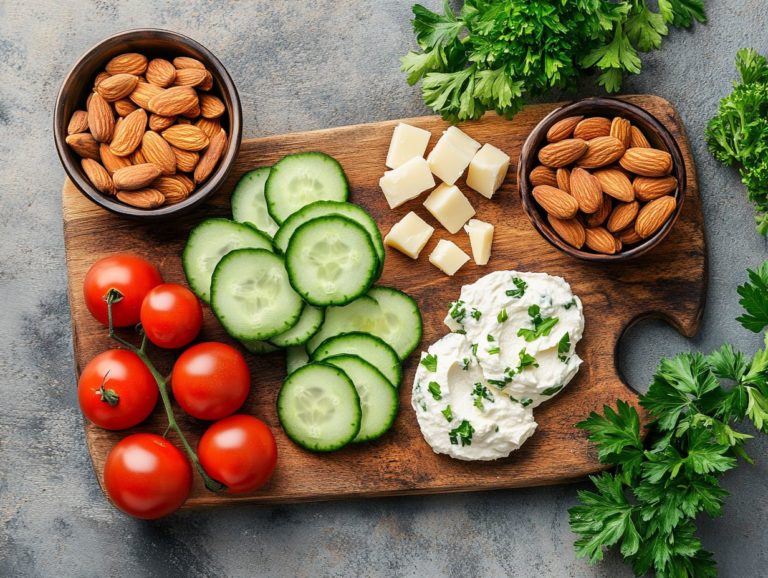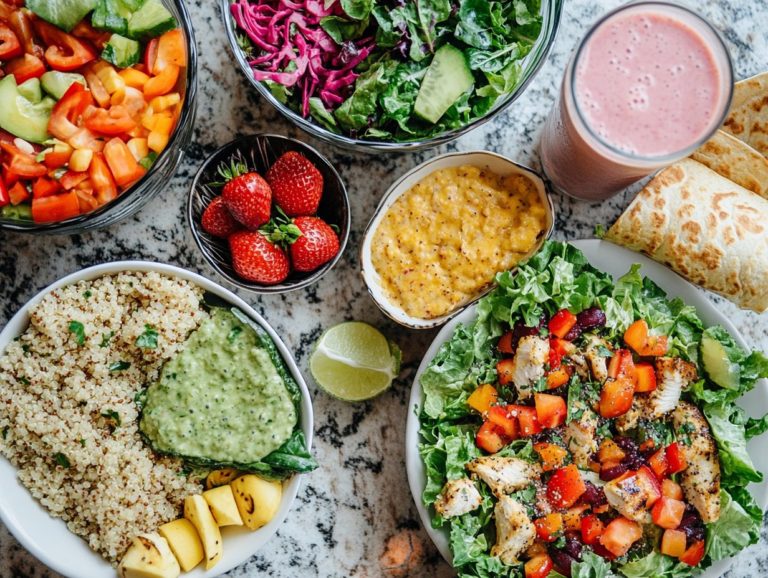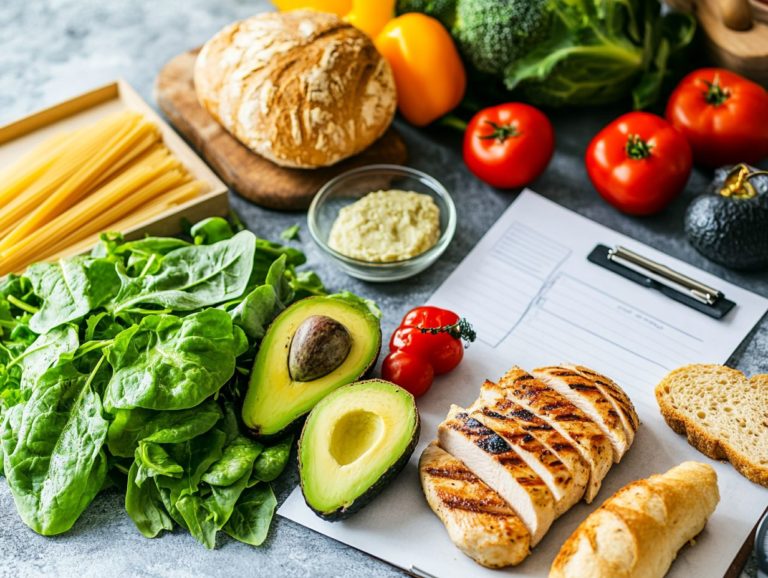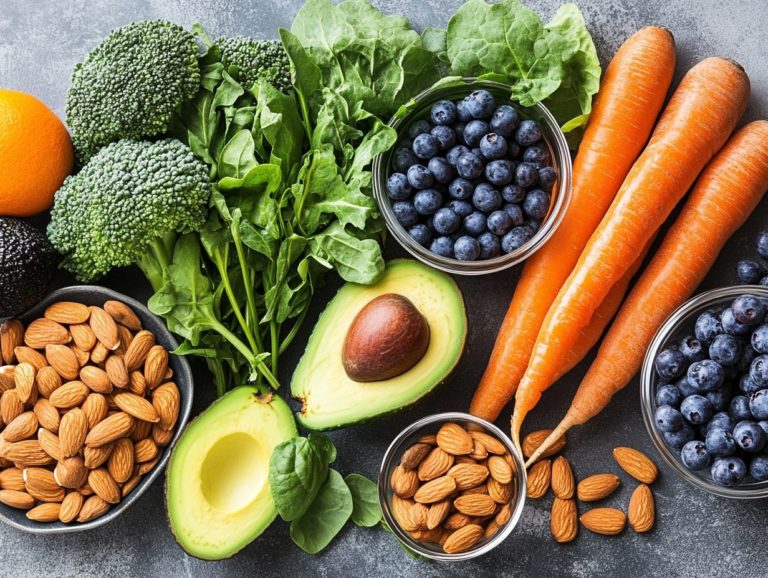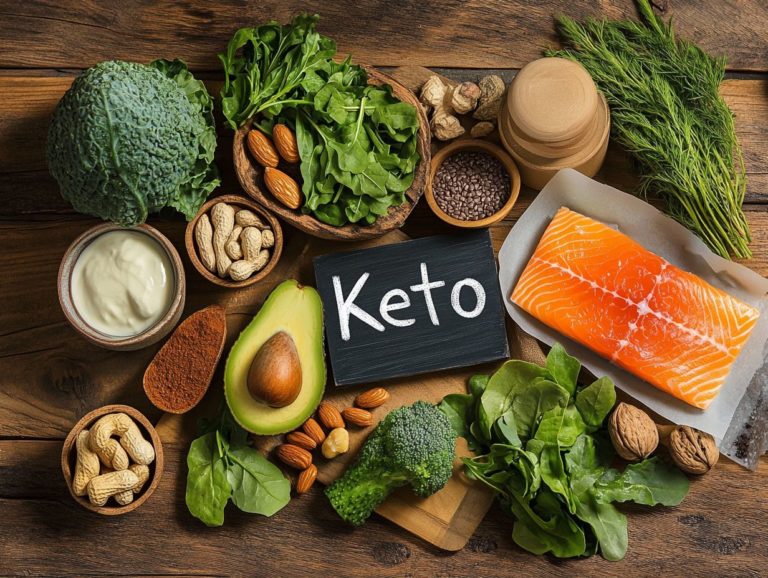Nutrition for Travelers: Healthy Choices on the Go
Traveling can transform into an exhilarating adventure, but it often throws your usual eating habits into disarray. Maintaining a healthy diet while you re on the road is essential for your physical well-being and enhances your overall travel experience.
Delve into practical strategies to keep your nutrition on point, from carefully planning meals and packing nourishing snacks to making smart choices at restaurants.
Discover why staying hydrated, managing dietary restrictions, and addressing jet lag matters. Dive into your adventures without compromising your health!
Contents
- Key Takeaways:
- Planning Ahead for Healthy Eating
- Traveling? Make Smart Choices at Restaurants
- Why Hydration Matters
- Staying Hydrated While Traveling
- Managing Dietary Restrictions and Food Allergies
- Dealing with Jet Lag and Its Effects on Nutrition
- Frequently Asked Questions
- 1. How can I maintain a healthy diet while traveling?
- 2. Is it possible to find healthy food options at airports or on the road?
- 3. What are some healthy options for breakfast while traveling?
- 4. How can I avoid overeating while on a trip?
- 5. What are some nutritious meals I can make in a hotel room?
- 6. How important is staying hydrated while traveling?
Key Takeaways:
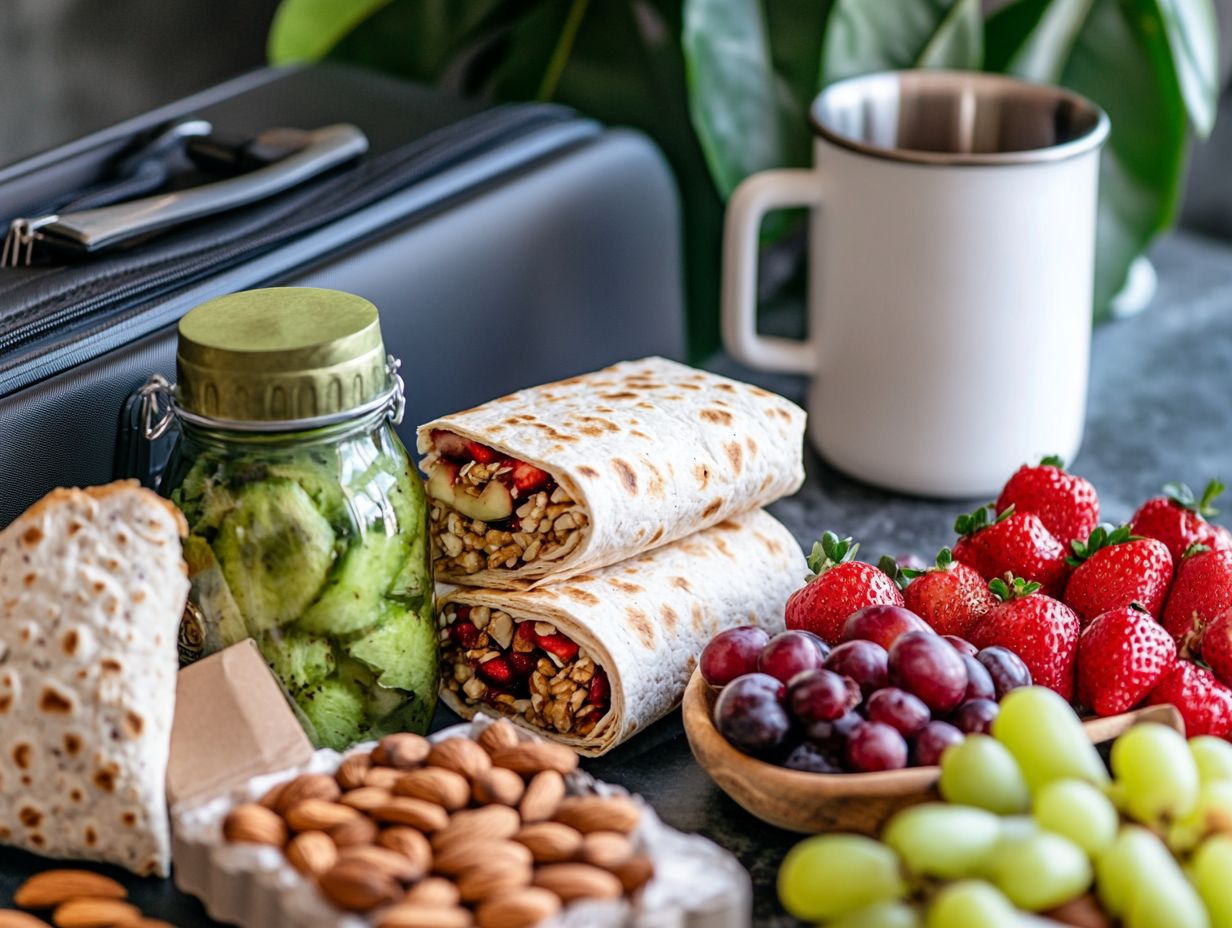
- Plan ahead by creating a meal plan and packing healthy snacks to maintain a nutritious diet while traveling.
- Choose healthy options at restaurants using strategies like portion control and selecting grilled or steamed dishes.
- Stay hydrated by drinking plenty of water and avoiding sugary drinks while on the go.
The Importance of Maintaining a Healthy Diet While Traveling
Maintaining a healthy diet while traveling is vital as it supports your energy levels, keeps your immune system functioning, and helps you avoid long-term consequences like obesity, diabetes, and heart disease. By prioritizing healthy eating practices, you can fully enjoy your journey without sacrificing your well-being.
Whether you re hitting the open road or jetting off to an exotic destination, recognizing the importance of nutritious foods can greatly enhance your travel experience.
Incorporating healthy options into your meals provides vital nutrients that sustain your energy and elevate your mood. Many travelers find that engaging in meal planning before their trips not only helps identify nutritious snacks but also facilitates a smooth transition to healthier food choices on the go.
Choosing whole foods, fruits, and vegetables can lead to improved digestion and overall satisfaction during your adventures. Consulting with registered dietitians (trained professionals who provide personalized nutrition advice) can further tailor these strategies, offering expert advice customized to your health needs and preferences.
By prioritizing a balanced eating approach on the road, you ensure that you can explore new places with vigor and enthusiasm.
Planning Ahead for Healthy Eating
Effective meal planning is crucial for maintaining healthy eating habits while traveling. By preparing nutritious meals and snacks in advance, you ensure that healthy options are readily available when hunger strikes.
Plan your meals now to fend off the temptation of unhealthy food later!
Creating a Meal Plan and Packing Healthy Snacks
Creating a meal plan and packing healthy snacks is a smart strategy to meet your dietary needs while on the move. This way, you always have nutritious options at your fingertips that align with your health goals. By preparing snacks ahead of time, you significantly reduce the temptation to grab unhealthy alternatives.
Taking the time to prep meals, like whipping up batch smoothies or assembling whole grain snack packs, can truly transform your travel experience. Consider incorporating ingredients like spinach, berries, and protein powder into your smoothies these are easy to blend and convenient to transport. Cooking whole grains like quinoa or brown rice in advance allows you to mix them with vegetables or lean proteins for portable lunches that keep you satisfied.
Focusing on portion sizes is vital to maintaining your energy levels without overindulging. By being mindful of your snack choices while traveling, you empower yourself to make better decisions and keep those unhealthy impulse purchases at bay.
Traveling? Make Smart Choices at Restaurants
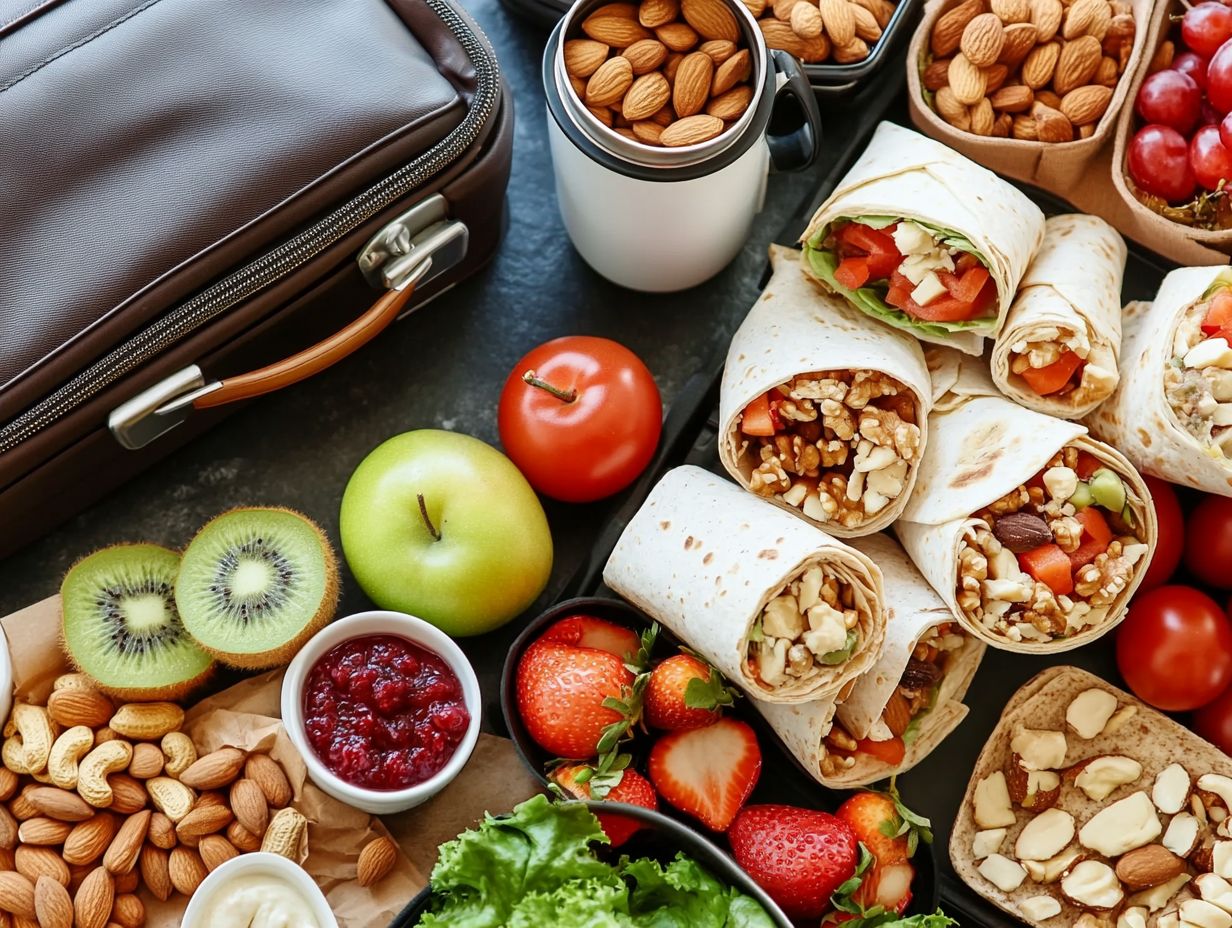
Making informed choices at restaurants is crucial for keeping your healthy eating habits on track while traveling. Dining out can present challenges, from the allure of fast food to a scarcity of nutritious options.
Explore online menus and consult with a registered dietitian a trained expert who helps you make healthy food choices to skillfully navigate your dining experiences. Discover meals that perfectly align with your dietary goals!
Strategies for Making Healthy Choices
Use simple strategies to choose healthy meals while dining out. This can profoundly influence your overall well-being during travel. Enjoy your meals without veering off your dietary goals.
Review online menus before you arrive at the restaurant. Pay attention to portion sizes to prevent overeating.
Choosing grilled options instead of fried alternatives will help you cut calories without sacrificing flavor! Prioritize fresh vegetables or plant-based dishes to elevate the nutritional quality of your meals.
Collaborating with a registered dietitian provides personalized advice that aligns with your dietary needs. Communicate your dietary restrictions clearly to restaurant staff so your requests are understood and respectfully accommodated.
Start planning your meals today for a healthier trip tomorrow!
Why Hydration Matters
Staying Hydrated While Traveling
Staying hydrated while traveling is crucial for maintaining your energy levels, thinking skills, and overall health. Dehydration can quickly lead to fatigue, headaches, and decreased alertness, making your journey less enjoyable.
Adopt effective hydration strategies like carrying a reusable water bottle and including hydrating foods in your travel snacks to ensure your body stays well-hydrated throughout your adventures.
Tips for Staying Hydrated on the Go
Implementing simple hydration tips can truly transform how refreshed and energized you feel during your travels. It ensures you remain focused and alert for every adventure that awaits.
Pack nutritious foods that also contribute to your overall fluid intake. Setting reminders on your phone or smartwatch can be a game changer, encouraging you to drink water regularly and warding off that dreaded mid-journey fatigue.
Opt for snacks like watermelon, cucumbers, or smoothies; they nourish you and significantly boost your hydration levels.
Carrying a reusable water bottle provides easy access to water no matter where you are. Staying adequately hydrated helps regulate your body temperature, improves your mood, and enhances your thinking skills all essential elements for making the most of your travel experience.
By making these small adjustments, you pave the way for a more pleasant and fulfilling journey.
Managing Dietary Restrictions and Food Allergies
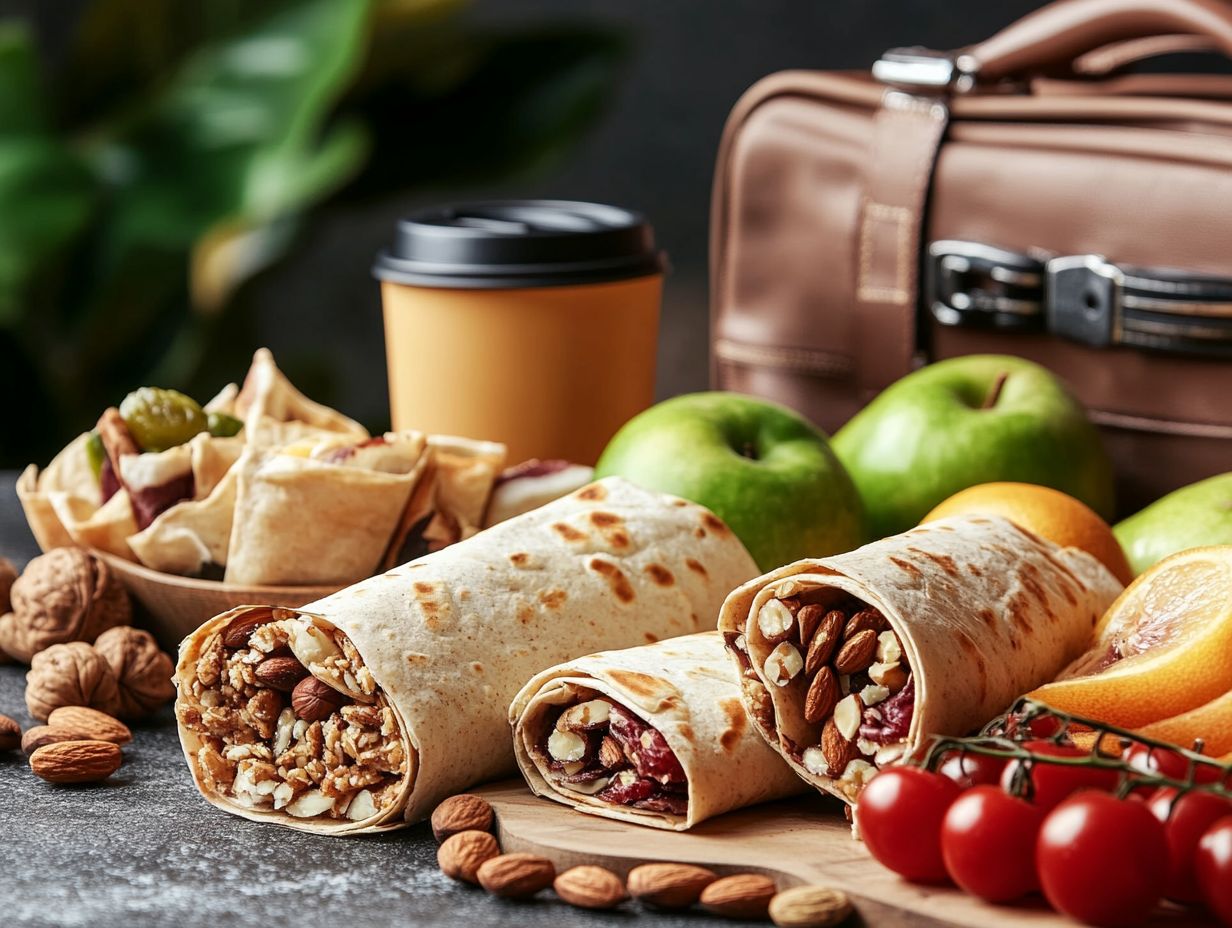
Managing dietary restrictions and food allergies while traveling may seem daunting, but it s crucial for avoiding negative health reactions and ensuring a delightful experience.
By sticking to your dietary preferences and planning ahead, you can pinpoint healthy options tailored to your specific needs. This proactive approach allows you to enjoy your travels with confidence and peace of mind regarding your food choices.
Navigating travel with dietary restrictions or food allergies demands thoughtful planning and acute awareness. This approach empowers you to maintain healthy options while deftly avoiding potential allergens that could disrupt your well-being.
By proactively communicating your dietary needs and preparing in advance, you can make informed choices that prioritize your health.
Start by packing safe snacks tailored to your dietary preferences; these can be true lifesavers during long journeys. Consider diving into the local cuisines of your destination to pinpoint common allergens that may be present in meals, aiding you in making safe dining selections.
Using online resources, such as food allergy networks, forums, and apps, can offer valuable insights into trustworthy restaurants and connect you with fellow travelers who share similar dietary concerns.
This careful planning boosts your confidence and enriches your travel experience, allowing you to fully savor each destination without compromising your health.
Dealing with Jet Lag and Its Effects on Nutrition
Navigating the challenges of jet lag and its impact on nutrition can be quite a hurdle for travelers like you. This experience can influence your energy levels, appetite, and overall well-being.
Understanding jet lag and choosing the right foods can help you tackle its effects head-on. This awareness will empower you to fully savor every moment of your travels.
How to Adjust Your Eating Habits to Combat Jet Lag
Adjusting your eating habits to combat jet lag is crucial for restoring your energy levels and optimizing your well-being during travel. It can significantly influence how swiftly you adapt to new time zones.
By implementing effective dietary strategies like regulating meal timing and ensuring proper hydration you can minimize the disruptive effects of jet lag.
Begin by gradually shifting your meal times to sync with the local schedule a few days before you depart; this simple adjustment can make a world of difference in easing the transition.
Focus on balanced nutrition by incorporating a variety of whole grains, lean proteins, and fresh fruits and vegetables, providing you with sustained energy and essential nutrients.
Prioritize hydration by drinking plenty of water throughout your journey, counteracting the dehydrating effects of air travel. Consider herbal teas or electrolyte drinks to boost hydration while soothing your system, setting you up for a smoother adjustment to your new environment.
Frequently Asked Questions
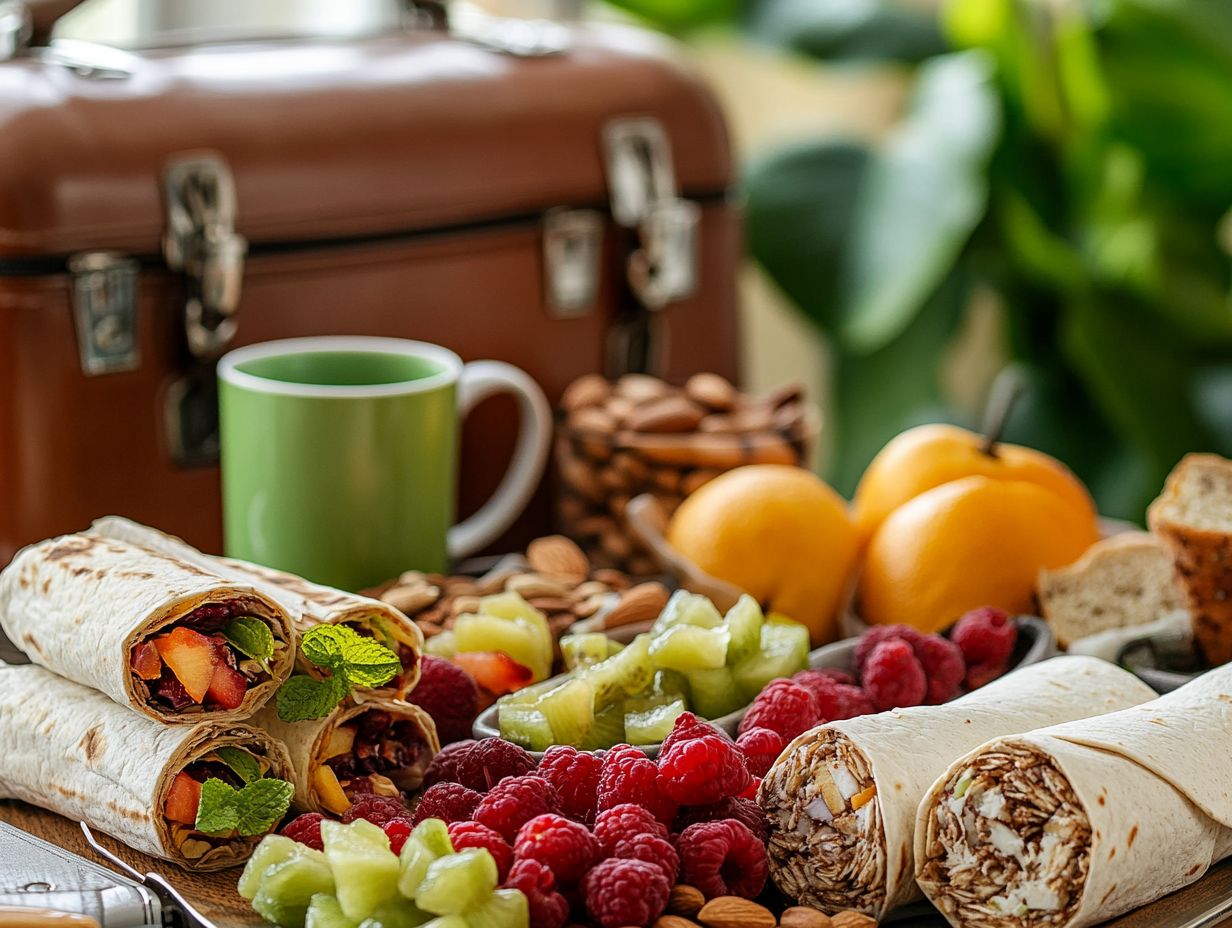
1. How can I maintain a healthy diet while traveling?
The key to maintaining a healthy diet while traveling is planning ahead. Make sure to pack nutritious snacks, research healthy restaurant options, and bring a refillable water bottle to stay hydrated.
2. Is it possible to find healthy food options at airports or on the road?
Yes, many airports and rest stops offer healthy food choices such as salads, sandwiches, and fresh fruit. You can also pack your own meals and snacks to avoid relying on fast food options.
3. What are some healthy options for breakfast while traveling?
Some healthy breakfast options for travelers include oatmeal, Greek yogurt with fruit, or a protein smoothie. You can also pack a homemade breakfast sandwich or hard-boiled eggs for a quick and easy meal.
4. How can I avoid overeating while on a trip?
Control portions and pay attention to your hunger cues. Opt for smaller meals and snacks throughout the day rather than indulging in large, heavy meals.
5. What are some nutritious meals I can make in a hotel room?
You can make a variety of nutritious meals in a hotel room using a microwave and mini-fridge. Some ideas include vegetable omelets, quinoa bowls, and veggie wraps. You can also pack healthy snacks like trail mix, fruit, and energy bars.
6. How important is staying hydrated while traveling?
Staying hydrated while traveling is crucial for maintaining energy levels, preventing dehydration, and aiding digestion. Make sure to drink plenty of water throughout the day, especially if you are flying or spending time in a hot climate.
Remember, a little planning goes a long way to keep your travels enjoyable and healthy!


